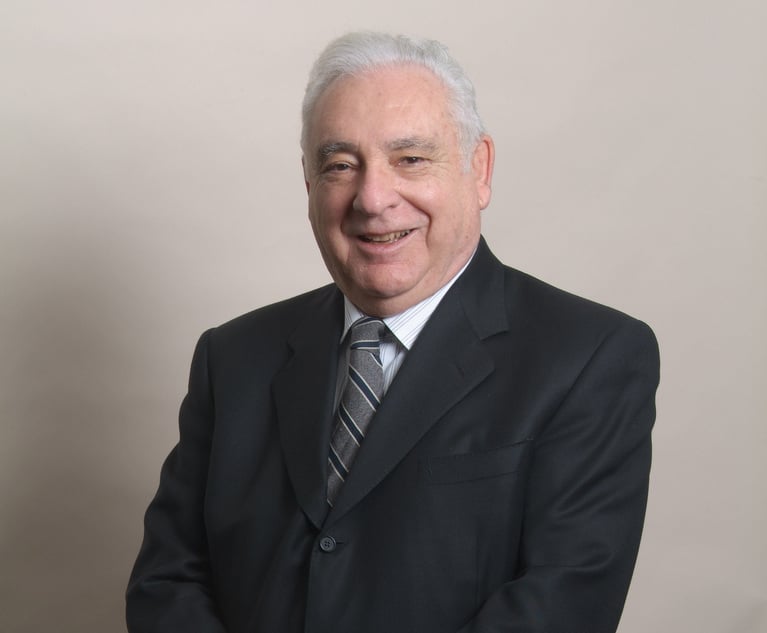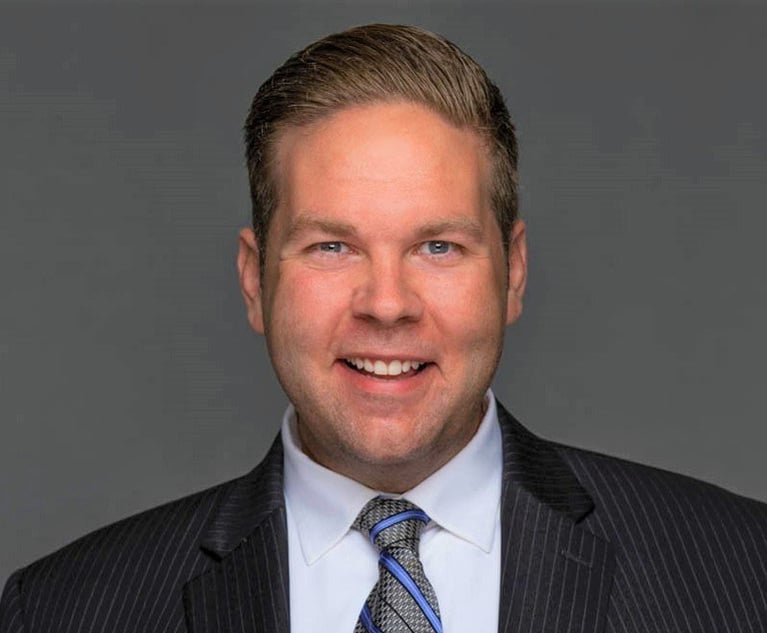 Credit: LightField Studios/Shutterstock.com
Credit: LightField Studios/Shutterstock.comFee Fight Between Texas, Phila. Firms in $44M Injury Case Stays in Pa.
“Moreover, by referring the clients to Sheridan & Murray and entering into a referral agreement, the Roberts Firm set in motion litigation in Pennsylvania from which the Roberts Firm hoped to profit,” Judge Joshua Wolson said.
August 16, 2019 at 12:14 PM
4 minute read
Nine months after the news of a $44 million settlement for a rural Texas oil worker severely injured on a Pennsylvania rig, lawyers from the two states are still litigating over how to split the fee and where to make that decision.
Their money remains in dispute, but their fight is going to stay in Philadelphia, a federal judge in Pennsylvania ruled Wednesday.
U.S. District Judge Joshua D. Wolson of the Eastern District of Pennsylvania denied a request to move the matter to the Eastern District of Texas from Randell Roberts and Roberts & Roberts.
Roberts is a partner with Roberts & Roberts in Tyler, Texas—halfway between Dallas and Shreveport in an area of East Texas known as Piney Woods.
Roberts is the lawyer for James Burgess and his wife, Kay Sharon Burgess, hired to represent them in 2013 after James Burgess was permanently paralyzed by a light falling on his head and breaking his neck. But the case had to be litigated in Pennsylvania because that’s where James Burgess was working when he was hurt. Later in the year, Roberts attended a seminar in California and met Thomas Sheridan of the Philadelphia plaintiffs firm Sheridan & Murray. They discussed the Burgess case in California, then followed up with emails about a referral fee agreement and an engagement.
Ultimately, Sheridan & Murray did take on the case, which settled for $44 million with five companies involved in the work at the oil rig. But Roberts and Sheridan continue to dispute the terms of their referral fee agreement.
Sheridan is being represented in the fee dispute by Mark Tanner of Feldman Shepherd Wohlgelernter Tanner Weinstock Dodig and Abe Reich of Fox Rothschild in Philadelphia.
Tanner said Friday the ruling was not unexpected.
“It was a jurisdictional dispute,” Tanner said. “The judge correctly recognized that a dispute over a case in Pennsylvania ought to be handled in Pennsylvania.”
Tanner said the two lawyers had a referral agreement, but after the case settled Roberts wanted more.
Justin Roberts of the Roberts Firm said there is more to the story.
“Mr. Tanner correctly states that the two lawyers had a written referral agreement, but he fails to mention that on the eve of settlement, Mr. Sheridan fraudulently induced Mr. Roberts to change that agreement—purportedly to help the clients, when it was only to benefit Mr. Sheridan,” Justin Roberts said. “In short, Mr. Sheridan took advantage of Mr. Roberts’s history of doing anything he can to help his clients. Mr. Sheridan then sued Mr. Roberts in an effort to avoid paying the customary referral fee in these types of cases.”
The judge rejected Roberts’ argument that Pennsylvania has no jurisdiction over the matter.
“The totality of the circumstances supports this court’s specific jurisdiction over the Roberts Firm. First, the Roberts Firm purposefully directed its activities at Sheridan & Murray. It communicated with Sheridan & Murray prior to entering into the referral agreement and after its formation,” Wolson said. “Moreover, by referring the clients to Sheridan & Murray and entering into a referral agreement, the Roberts Firm set in motion litigation in Pennsylvania from which the Roberts Firm hoped to profit.”
The judge did agree with Roberts that James and Kay Burgess cannot travel to Philadelphia to litigate the dispute. He’s been in a hospital for years and she has driven 90 miles each way from their home to visit him every day. But the judge shut down Roberts’ characterization of them as “critical” witnesses.
“The clients themselves are not parties to the referral agreements,” Wolson said.
The case is Sheridan v. Roberts.
This content has been archived. It is available through our partners, LexisNexis® and Bloomberg Law.
To view this content, please continue to their sites.
Not a Lexis Subscriber?
Subscribe Now
Not a Bloomberg Law Subscriber?
Subscribe Now
NOT FOR REPRINT
© 2025 ALM Global, LLC, All Rights Reserved. Request academic re-use from www.copyright.com. All other uses, submit a request to [email protected]. For more information visit Asset & Logo Licensing.
You Might Like
View All

Samuel M. Lehrer, Retired Philadelphia Court of Common Pleas Judge, Dies
1 minute read

Longtime Reed Smith Health Care Partner Opts for Solo Practice Over Retirement
3 minute readTrending Stories
- 1Special Series Part 2: CT Constitution’s Text Does Not Authorize the Statutory Guardrails
- 2Initial Steps to Set Up a Fla. Appeal: Your Future Self (or Appellate Attorney) Will Thank You
- 3Bar Report - Jan. 6
- 4New York’s Property Tax Incentives and Abatements Make Development Feasible
- 5Legal Tech's Predictions for Artificial Intelligence in 2025
Who Got The Work
Michael G. Bongiorno, Andrew Scott Dulberg and Elizabeth E. Driscoll from Wilmer Cutler Pickering Hale and Dorr have stepped in to represent Symbotic Inc., an A.I.-enabled technology platform that focuses on increasing supply chain efficiency, and other defendants in a pending shareholder derivative lawsuit. The case, filed Oct. 2 in Massachusetts District Court by the Brown Law Firm on behalf of Stephen Austen, accuses certain officers and directors of misleading investors in regard to Symbotic's potential for margin growth by failing to disclose that the company was not equipped to timely deploy its systems or manage expenses through project delays. The case, assigned to U.S. District Judge Nathaniel M. Gorton, is 1:24-cv-12522, Austen v. Cohen et al.
Who Got The Work
Edmund Polubinski and Marie Killmond of Davis Polk & Wardwell have entered appearances for data platform software development company MongoDB and other defendants in a pending shareholder derivative lawsuit. The action, filed Oct. 7 in New York Southern District Court by the Brown Law Firm, accuses the company's directors and/or officers of falsely expressing confidence in the company’s restructuring of its sales incentive plan and downplaying the severity of decreases in its upfront commitments. The case is 1:24-cv-07594, Roy v. Ittycheria et al.
Who Got The Work
Amy O. Bruchs and Kurt F. Ellison of Michael Best & Friedrich have entered appearances for Epic Systems Corp. in a pending employment discrimination lawsuit. The suit was filed Sept. 7 in Wisconsin Western District Court by Levine Eisberner LLC and Siri & Glimstad on behalf of a project manager who claims that he was wrongfully terminated after applying for a religious exemption to the defendant's COVID-19 vaccine mandate. The case, assigned to U.S. Magistrate Judge Anita Marie Boor, is 3:24-cv-00630, Secker, Nathan v. Epic Systems Corporation.
Who Got The Work
David X. Sullivan, Thomas J. Finn and Gregory A. Hall from McCarter & English have entered appearances for Sunrun Installation Services in a pending civil rights lawsuit. The complaint was filed Sept. 4 in Connecticut District Court by attorney Robert M. Berke on behalf of former employee George Edward Steins, who was arrested and charged with employing an unregistered home improvement salesperson. The complaint alleges that had Sunrun informed the Connecticut Department of Consumer Protection that the plaintiff's employment had ended in 2017 and that he no longer held Sunrun's home improvement contractor license, he would not have been hit with charges, which were dismissed in May 2024. The case, assigned to U.S. District Judge Jeffrey A. Meyer, is 3:24-cv-01423, Steins v. Sunrun, Inc. et al.
Who Got The Work
Greenberg Traurig shareholder Joshua L. Raskin has entered an appearance for boohoo.com UK Ltd. in a pending patent infringement lawsuit. The suit, filed Sept. 3 in Texas Eastern District Court by Rozier Hardt McDonough on behalf of Alto Dynamics, asserts five patents related to an online shopping platform. The case, assigned to U.S. District Judge Rodney Gilstrap, is 2:24-cv-00719, Alto Dynamics, LLC v. boohoo.com UK Limited.
Featured Firms
Law Offices of Gary Martin Hays & Associates, P.C.
(470) 294-1674
Law Offices of Mark E. Salomone
(857) 444-6468
Smith & Hassler
(713) 739-1250





